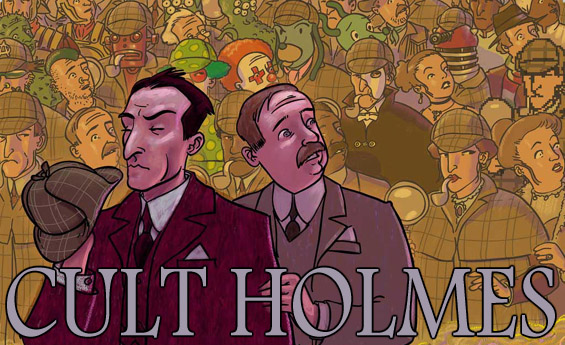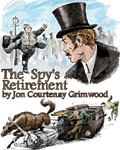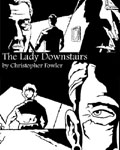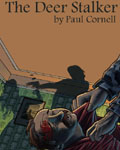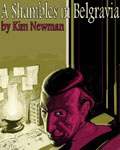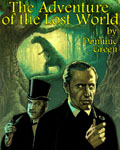

 The Adventures of Sexton Blake
The Adventures of Sexton Blake
Based on the character created by Harry Blyth; Performed by a full cast
2 CDs or MP3 Download – Approx. 2 Hours [RADIO DRAMA]
Publisher: BBC Audiobooks / Perfectly Normal Productions
Published: September 2009
ISBN: 1408410540
Themes: / Mystery / Adventure / Crime / Steampunk / Airships / London / Exmouth / Willesden /
Britain’s iconic and most prolifically chronicled sleuth explodes back into action in a brand new series of thrilling Adventures packed with incident and hilarity!
Back in 2006 we had a story about the new co-venture between Perfectly Normal productions and BBC Audiobooks. Audio drama legend Dirk Maggs was set to revive several “cult British comic characters.” This is the first of these. I hope there will be MANY MORE!
Sexton Blake, a renowned Baker Street detective, and his youthful assistant Tinker regularly face peril with deceptive disguises and flying fists. In between investigations they return to their Baker Street rooming house for endless lashings of tea and heaping plates of kippers. Their landlady, Mrs. Bardell, makes the food, debriefs the great detective, and commiserates with her neighbor, Mrs. H. (she’s also a landlady to another famous Baker street detective). The story begins aboard a runaway locomotive at the tail end of a kind of locked room mystery – after a few shootings by the various suspicious characters and a brief detour into the dining car’s wine cellar, the villain is revealed -only to escape by auto-gyro. When Blake returns to his Baker street residence he’s soon embroiled in a new investigation brought on by the arrival of a beautiful American actress. The investigation is both serpentine and ingenious, and it leads directly into the next – one in which an incredibly capable and amnesic woman saves Blake and Tinker from a false charge of burglary. Their investigation into her curious abilities and former profession lead Blake and Tinker into a house of deathtraps (or is that a deathtrap house). The action finally culminates in a thrilling saber duel atop a Zeppelin! At the beginning of each new episode there’s a mini-scene from an unrelated Sexton Blake adventure – each depicting Blake defeating either a rapscallious villain or a villainous rapscallion.
The Adventures Of Sexton Blake is jam packed with as much rib-tickling raillery as The Hitch-Hiker’s Guide To The Galaxy. The script is unbelievably clever and funny. It features a kind of endless stream-of-consciousness wordplay that clearly follows in the tradition of Douglas Adams, Monty Python, and The Goon Show. What sets it apart from it’s forebearers is a strict adherence to the medium. The only possible way to tell this tale is as an audio drama. Perhaps the most amazing aspect is vaguely amazing feeling I got while listening to it. There’s this kind of general consensus by all the characters to LARP their way through the adventure. No one character has the final word on anything, and every character in the scene is constantly throwing new nuance on the mental pictures being created in the listener. It’s not so much a mystery you can solve by following the clues, it’s more of an adventure you can ride with a flashing smirk.
These adventures are brilliantly envisioned by a terrific combination of skilled comedic acting, an engaging theme song and thousands of layered sound effects. I’m betting the script was at least twice as thick, per minute, as a typical (or ordinary, or normal) one. The outstanding cast and crew has made The Adventures Of Sexton Blake a play that can stand shoulder to shoulder, chin to chin, and eye to eye, with the finest audio dramatizations ever produced – and not feel even the slightest weak in the knees. This is very highly recommended listening!
Crew:
Written by Mil Millington and Jonathan Nash; Directed by Dirk Maggs
Sound Design and Music by Paul Weir
Produced by David Morley
Cast:
Simon Jones ….. Sexton Blake, Adventuring Detective
Wayne Forester …. Tinker, his Plucky Assistant
June Whitfield …. Mrs Bardell, their Doughty Housekeeper
Graham Hoadly …. Professor Kew, a Spindly Cackler
Lorelei King …. Miss Elizabeth Mary-Louise Tarabelle Beauchamp
Simon Treves …. Inspector Coutts Of Scotland Yard
Felicity Duncan …. Miss Terry, Window-Leaping Adventuress
Susan Sheridan …. Mrs Hudson, Housekeeper To A Neighbouring Detective
Malcolm Brown …. Count Ivor Carlac, a Villainous Juggernaut
Philip Glassborow …. Cyril, A Grim Assassin
Oscar Sharp …. The Frantic Caller
William Franklyn …. The Mysterious Waiter
Posted by Jesse Willis

 Elliot Miller, one of the participants in last year’s SFFaudio Challenge has completed his audiobook project! Elliot recorded one of the funnest, and funniest SF novels of the 1950s:
Elliot Miller, one of the participants in last year’s SFFaudio Challenge has completed his audiobook project! Elliot recorded one of the funnest, and funniest SF novels of the 1950s: 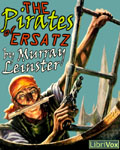 The Pirates Of Ersatz
The Pirates Of Ersatz

 The Adventures of Sexton Blake
The Adventures of Sexton Blake

